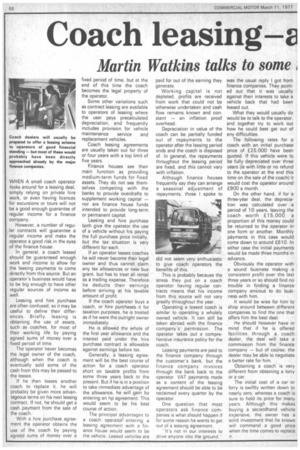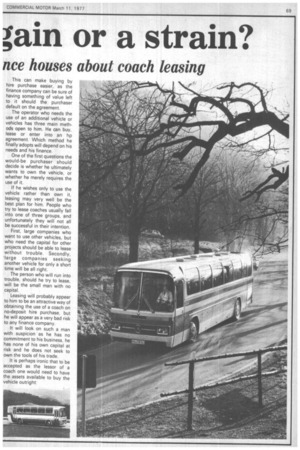Coach leasing e • •
Page 72

Page 73

If you've noticed an error in this article please click here to report it so we can fix it.
gain or a strain?
•
Martin Watkins talks to some nce houses about coach leasing
WHEN A small coach operator looks around for a leasing deal, simply relying on private hire work, or even having licences for excursions or tours will not be a good enough guarantee of regular income for a finance company.
However, a number of regular contracts will guarantee a regular income and make the operator a good risk in the eyes of the finance house.
In general, a coach leased should be guaranteed enough work and income to allow for the leasing payments to come directly from this source. But an operator's business would have to be big enough to have other regular sources of income as well.
Leasing and hire purchase are often confused, so it may be useful to define their differences. Briefly, leasing is obtaining the use of assets, such as coaches, for most of their working life by paying agreed sums of money over a fixed period of time.
The operator 'never becomes the legal owner of the coach, although when the coach is eventually sold some of the cash from this may be passed to the lessee.
If he then leases another coach to replace it, he will probably be given more advantageous terms on his next leasing contract, If not, he should get a cash payment from the sale of the coach.
With a hire purchase agreement the operator obtains the use of the coach by paying agreed sums of money over a fixed period of time, but at the end of this time the coach becomes the legal property of the operator.
Some other variations such as contract leasing are available to operators of leasing where the user pays precalculated depreciation, and frequently includes provision for vehicle maintenance service and replacement vehicles.
Coach leasing agreements are usually taken out for three or four years with a top limit of five years.
Finance houses see their main function as providing medium-term funds for fixed assets. They do not see themselves competing with the banks to provide overdrafts to supplement working capital -nor are finance house funds intended to provide long-term or permanent capital.
Leasing and hire purchase both give the operator the use of a vehicle without his paying the full purchase price initially, but the tax situation is very different for each If an operator leases coaches he will never become their legal owner and thus cannot claim any tax allowances or new bus grant, but has to treat all rental as a trading expense. Therefore he deducts their earnings before • arriving at his taxable amount of profit.
If the coach operator buys a coach, or hire purchases it for taxation purposes, he is treated as if he were the outright owner immediately.
He is allowed the whole of the first year allowance and the interest paid under the hire purchase contract is allowable against earnings before tax.
Generally, a leasing agreement will be the best course of action for a coach operator short on taxable profits from some three years back to the present. But if he is in a position to take immediate advantage of the allowance, he will gain by entering an hp agreement. This would seem to be his best course of action.
The principal advantages to a coach operator entering a leasing agreement with a finance house would seem to be the vehicle Leased vehicles are
paid for out of the earning they generate.
Working capital is not depleted, profits are received from work that could not be otherwise undertaken and cash flow remains known and constant — an inflation proof overhead.
Depreciation in value of the coach can be partially funded out of repayments to the operator after the leasing period ends and the coach is disposed of. In general, the repayments throughout the leasing period are fixed, and this cannot vary with inflation.
Although finance houses frequently say they can arrange a seasonal adjustment of repayments, those I spoke to did not seem very enthusiastic to give coach operators the benefits of this.
This is probably because the stress they put on a coach operator having regular contracts means that his income from this source will not vary greatly throughout the year.
Operating a leased coach is similar to operating a wholely owned vehicle. It can still be taken abroad with the finance company's permission. The operator takes out a comprehensive insurance policy for the coach.
Leasing payments are paid to the finance company through the customer's bank, but the finance company invoices through the bank back to the operator. VAT payments made as a content of the leasing agreement should be able to be reclaimed every quarter by the operator.
One question that most operators ask finance companies is what should happen if for some reason he wants to get out of a leasing agreement.
-It's not in our interests to drive anyone into the ground,
was the usual reply I got from finance companies. They pointed out that it was usually against their interests to take a vehicle back that had been leased out.
What they would usually do would be to talk to the operator, and together try to work out how he could best get out of any difficulties.
The following rates for a coach with an initial purchase price of £25,000 have been quoted. If this vehicle were to be fully depreciated over three years (ie with little or no refund to the operator at the end this time on the sale of the coach) it would cost the operator around £900 a month.
On the other hand, if for a three-year deal, the depreciation was calculated over a period of 10 years, leaving the coach worth £15,000, a proportion of this money could be returned to the operator in one form or another. Monthly payments in this case would come down to around £610. In either case the initial payments would be made three months in advance.
Obviously the operator with a sound business making a consistent profit over the last three years or so should find no trouble in finding a finance company anxious to do business with him.
It would be wise for him to shop around between different companies to find the one that offers him the best deal.
He should however have in mind that if he is offered facilities through a coach dealer, the deal will take a commission from the . finance company -but of course, the dealer may be able to negotiate a better rate for him.
Obtaining a coach is very different from obtaining a lorry or a car.
The initial cost of a car or lorry is swiftly written down to nearly zero, whereas a coach is
sure to hold its price for many years. Although this makes
buying a secondhand vehicle expensive, the owner has a solid investment that he knows will command a good price when the time comes to replace This can make buying by hire purchase easier, as the finance company can be sure of having something of value left to it should the purchaser default on the agreement.
The operator who needs the use of an additional vehicle or vehicles has three main methods open to him. He can buy, lease or enter into an hp agreement. Which method he finally adopts will depend on his needs and his finance.
One of the first questions the would-be purchaser should decide is whether he ultimately wants to own the vehicle, or whether he merely requires the use of it.
If he wishes only to use the vehicle rather than own it, leasing may very well be the best plan for him. People who try to lease coaches usually fall into one of three groups, and unfortunately they will not all be successful in their intention.
First, large companies who want to use other vehicles, but who need the capital for other projects should be able to lease without trouble. Secondly, large companies seeking another vehicle for only a short time will be all right.
The person who will run into trouble, should he try to lease, will be the small man with no capital.
Leasing will probably appear to him to be an attractive way of obtaining the use of a coach on no-deposit hire purchase, but he will appear as a very bad risk to any finance company.
It will look on such a man with suspicion as he has no commitment to his business, he has none of his own capital at risk and he does not seek to own the tools of his trade.
It is perhaps ironic that to be accepted as the lessor of a coach one would need to have the assets available to buy the vehicle outright.






















































































































